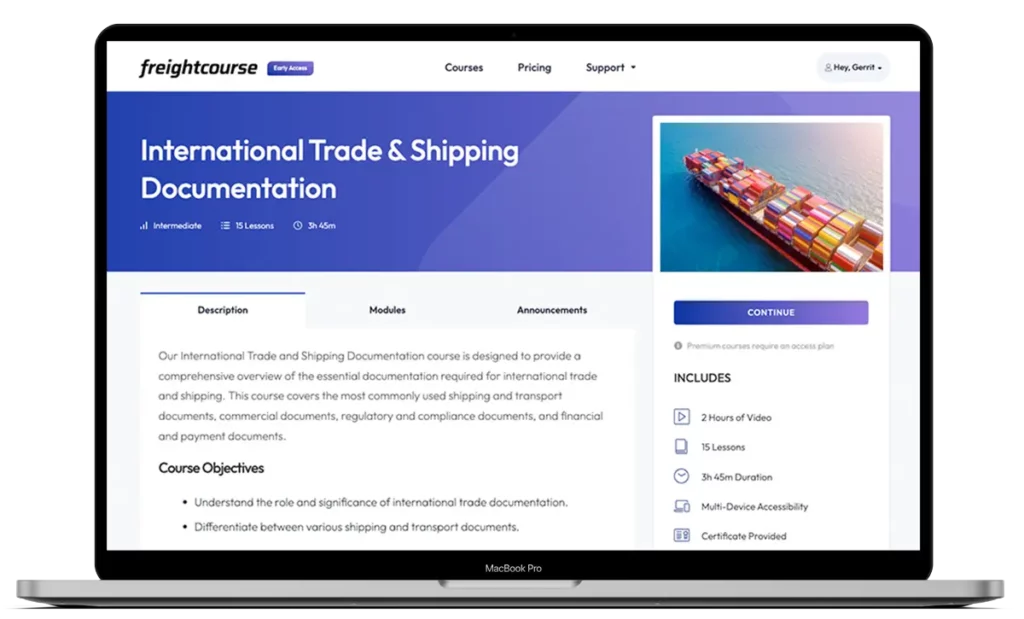In the world of shipping and logistics, supply chains have become increasingly complex whereby shipments can be handled by multiple parties. Terms are often used interchangeably and oftentimes people mistake the definition and scope of a freight forwarder and a customs broker.
What’s the difference between a freight forwarder and a customs broker?
To get right to the answer, customs brokers are specifically licensed to clear cargo on the import or export side and to report duties and taxes to customs authorities. On the other hand, freight forwarders are companies that have a larger scope. They typically arrange and facilitate shipments, as well as the relevant documentation via sea, air or land freight, which can also include customs clearance.
Since freight forwarders have the ability to handle shipments from end-to-end, it’s very common for freight forwarders to also handle the customs clearance process. Let’s explore this in a little more detail.
What is a Customs Broker?
Let’s start with customs brokerages. A customs broker is a licensed company that carries out the specific task of customs clearance, when cargo leaves or reaches a border. This border is typically a port of entry or exit of a country, for example an airport or sea port.
The task of a customs broker is to report to the respective local customs authorities all the required information to clear your cargo through customs. Without this process, you won’t be able to import or export your shipment.
In order for a customs broker to do this, they typically require a packing list, invoice, information of the goods and the document of carriage (for example, bill of lading, sea waybill or airway bill).
On behalf of you, they will proceed to fill out a declaration form containing all of the relevant information that is required to import or export the cargo. Certain countries have different rules and regulations and therefore a customs broker must be licensed in each respective country.
Here is the scope of a typical customs broker:
- Declare goods to customs authorities
- HS code harmonization (HTSUS in the US)
- Duty outlays
- Duty drawback
- Advanced filings (AMS, ENS, etc.)
- Customs bond applications
Customs Broker Case Study
A wine exporter in Kentucky wants to export 3 x 40’ containers to their customer in Singapore. They have agreed to ship the cargo via the DDP Incoterm and are required to deliver the cargo to the consignee’s warehouse at destination.
As their freight forwarder only has an operating license in the US, they are arranging the cargo pickup, customs clearance and transport of the cargo up to the port of Singapore.
The wine exporter has now requested the freight forwarder to hand the documentation to an appointed customs broker in Singapore, who will declare the cargo to the local customs authorities.
In this case study, the customs broker is helping the wine exporter to declare the cargo, so that it can be legally imported. As wine is a dutiable good, the broker needs to file all required documentation and outlay the duties and taxes for the wine exporter.
Key Takeaway:
A customs broker is a licensed individual or company that is specifically tasked to declare cargo for import or export purposes, on behalf of an importer or exporter.
What is a Freight Forwarder?
Let’s take a closer look at the role of freight forwarders. A freight forwarder is a licensed entity, which is appointed by an importer or exporter and arranges and ships cargo from one location to another.
Depending on the local rules and regulations of a country, freight forwarders require a license to operate. In the United States, this is done through the Federal Maritime Commission (FMC).
A freightwarder’s scope is broad and can include land, sea and air transport, customs clearance, documentation handling, shipment tracking and much more. If a freight forwarder also owns the contract of carriage and does not own any vessels, they are known as non-vessel operating common carriers (NVOCCs).
It’s extremely common for freight forwarders to arrange shipments through an end-to-end process, meaning that they can be responsible for moving the cargo from pickup until final delivery.
Here is a typical scope of a freight forwarder:
- Arranging land transport for pickup and delivery
- Arranging and owning air or ocean carriage
- Shipment tracking
- Documentation handling
- Customer service
- Vendor liaison
- Customs clearance
Freight Forwarder Case Study
An exporter in Hamburg, Germany is looking to export a shipment of 250 kg via air freight to Dallas, Texas. The agreed terms stipulate that the exporter is required to arrange and deliver the shipment to the consignee’s premises.
The exporter in Hamburg decides to appoint a multinational freight forwarder to arrange the freight and documentation, as they have an entity in Germany and in the United States.
In this scenario, the freight forward will arrange the collection of goods in Germany, process the export customs clearance, issue the airway bill, process the import customs clearance and deliver the consignment to the final destination at the consignee’s premises.
As you can see, the freight forwarder’s scope covered the end-to-end process of the entire shipment, including customs clearance at the origin and destination.
Key Takeaway:
A freight forwarder is a licensed individual or company who arranges and manages the movement of cargo from one location to another. Most freight forwarders also have a customs brokerage license.
Similarities and Differences between Customs Brokers and Freight Forwarders
As you were able to deduce from the scope of the customs broker and freight forwarder, both have several similarities and differences. Let’s highlight them again for clarity.
Both customs brokers and freight forwarders need to be licensed, in order to operate legally. Another aspect they have in common is that both can be tasked with customs clearance, along with its related tasks.
While the sole purpose of a customs broker is to ensure the reporting of all relevant information to customs authorities, in order to clear the cargo, a freight forwarder is also able to do this, given that they possess a valid customs clearance license.
Here is where the similarities end. As opposed to a customs broker, a freight forwarder takes on a wider scope, which can include transport arrangement, tracking, customer service, customs brokerage and much more.
Here is a quick summary of the similarities and differences between customs brokers and freight forwarders:
Similarities
- Both are typically required to have a license in order to operate
- Both can cover the scope of customs clearance
Differences
- Customs brokers are only tasked with customs clearance
- Freight forwarders have a broader scope, which often includes customs clearance
- Both are usually regulated through different governing bodies
When Should You Use a Freight Forwarder Over a Customs Broker?
As you were able to see in the case studies above, it really depends on what your requirements are for a particular shipment. If you have an appointed freight forwarder that can also perform the duties of a customs broker, then it’s mostly wise to let them handle the entire process.
This is because using multiple parties in your shipment process may increase costs, as both parties will typically charge you a handling fee. In fact, most freight forwarders will also have a specialized department that covers customs clearance.
In certain scenarios, you may want to engage a customs brokerage separately at origin or destination. A common scenario for this is when your customer requests you to use a certain customs broker or if your freight forwarder is not a licensed customs broker and can therefore not submit the required customs documentation on your behalf.
Is This Applicable to Sea and Air Freight?
Yes, customs brokers and freight forwarders each have their scope that applies to all modes of transport, so long as the cargo crosses a border. This is true for sea freight, air freight and land transport such as by rail or truck.
Therefore, it’s important to ensure that your freight forwarder and your customs broker possess a valid license to legally carry out their duties.
In the US, customs brokers are licensed through the U.S. Customs and Border Protection (CBP), whereby a freight forwarder is licensed by the Federal Maritime Commission (FMC).
Each country will have their own licensing and governing bodies for freight forwarders and customs brokers, respectively.

Get Free Course Access
If you enjoyed the article, don’t miss out on our free supply chain courses that help you stay ahead in your industry.

Gerrit Poel
Co-Founder & Writer
at freightcourse
About the Author
Gerrit is a certified international supply chain management professional with 16 years of industry experience, having worked for one of the largest global freight forwarders.
As the co-founder of freightcourse, he’s committed to his passion for serving as a source of education and information on various supply chain topics.
Follow us